2006年全国高考英语试题四川卷及答案详解
- 格式:doc
- 大小:166.00 KB
- 文档页数:16
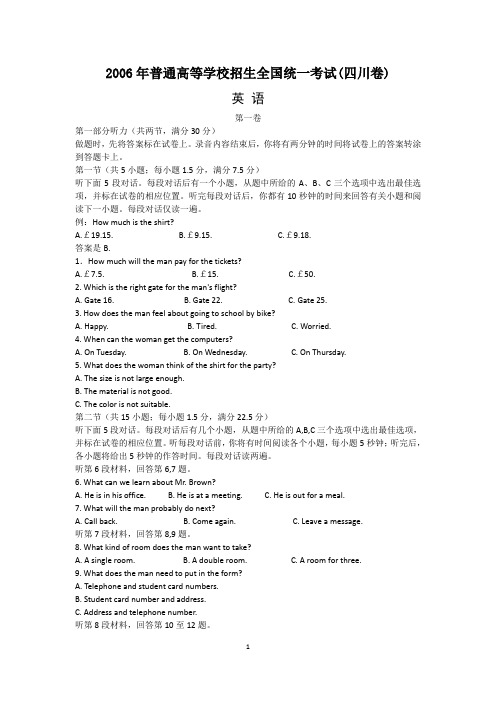
2006年普通高等学校招生全国统一考试(四川卷)英语第一卷第一部分听力(共两节,满分30分)做题时,先将答案标在试卷上。
录音内容结束后,你将有两分钟的时间将试卷上的答案转涂到答题卡上。
第一节(共5小题;每小题1.5分,满分7.5分)听下面5段对话。
每段对话后有一个小题,从题中所给的A、B、C三个选项中选出最佳选项,并标在试卷的相应位置。
听完每段对话后,你都有10秒钟的时间来回答有关小题和阅读下一小题。
每段对话仅读一遍。
例:How much is the shirt?A.£19.15.B.£9.15.C.£9.18.答案是B.1.How much will the man pay for the tickets?A.£7.5.B.£15.C.£50.2. Which is the right gate for the man's flight?A. Gate 16.B. Gate 22.C. Gate 25.3. How does the man feel about going to school by bike?A. Happy.B. Tired.C. Worried.4. When can the woman get the computers?A. On Tuesday.B. On Wednesday.C. On Thursday.5. What does the woman think of the shirt for the party?A. The size is not large enough.B. The material is not good.C. The color is not suitable.第二节(共15小题;每小题1.5分,满分22.5分)听下面5段对话。
每段对话后有几个小题,从题中所给的A,B,C三个选项中选出最佳选项,并标在试卷的相应位置。
听每段对话前,你将有时间阅读各个小题,每小题5秒钟;听完后,各小题将给出5秒钟的作答时间。
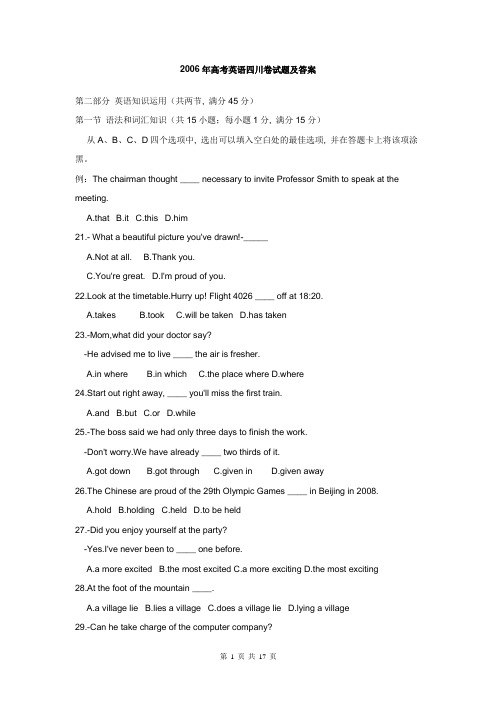
2006年高考英语四川卷试题及答案第二部分英语知识运用(共两节, 满分45分)第一节语法和词汇知识(共15小题;每小题1分, 满分15分)从A、B、C、D四个选项中, 选出可以填入空白处的最佳选项, 并在答题卡上将该项涂黑。
例:The chairman thought ____ necessary to invite Professor Smith to speak at the meeting.A.thatB.itC.thisD.him21.- What a beautiful picture you've drawn!-_____A.Not at all.B.Thank you.C.You're great.D.I'm proud of you.22.Look at the timetable.Hurry up! Flight 4026 ____ off at 18:20.A.takesB.tookC.will be takenD.has taken23.-Mom,what did your doctor say?-He advised me to live ____ the air is fresher.A.in whereB.in whichC.the place whereD.where24.Start out right away, ____ you'll miss the first train.A.andB.butC.orD.while25.-The boss said we had only three days to finish the work.-Don't worry.We have already ____ two thirds of it.A.got downB.got throughC.given inD.given away26.The Chinese are proud of the 29th Olympic Games ____ in Beijing in 2008.A.holdB.holdingC.heldD.to be held27.-Did you enjoy yourself at the party?-Yes.I've never been to ____ one before.A.a more excitedB.the most excitedC.a more excitingD.the most exciting28.At the foot of the mountain ____.A.a village lieB.lies a villageC.does a village lieD.lying a village29.-Can he take charge of the computer company?-I'm afraid it's ____ his ability.A.beyondB.withinC.of C.to30.-It's thirty years since we last met.-But I still remember the story,believe it or not, ____ we got lost on a rainy night.A.whichB.thatC.whatD.when31.Of all the books on the desk, ____ is of any use for our study.A.nothingB.no oneC.neitherD.none32.-Is Jack on duty today?-It ____ be him.It's his turn tomorrow.A.mustn'tB.won'tC.can'tD.needn't33. ____ with so much trouble,we failed to complete the task on time.A.FacedB.FaceC.FacingD.To face34.-Do you mind my smoking her?A.No,thanks.B.No. Good idea.C.Yes,please.D.Yes.Better not.35.-Why didn't you tell him about the meeting?-He rushed out of the room ____ I could say a word.A.beforeB.untilC.whenD.after第二节完形填空(共20小题;每小题1.5分, 满分30分)阅读下面短文, 从短文后所给的四个选项(A、B、C和D)中, 选出可以填入空白处的最佳选项, 并在答题卡上将该项涂黑。
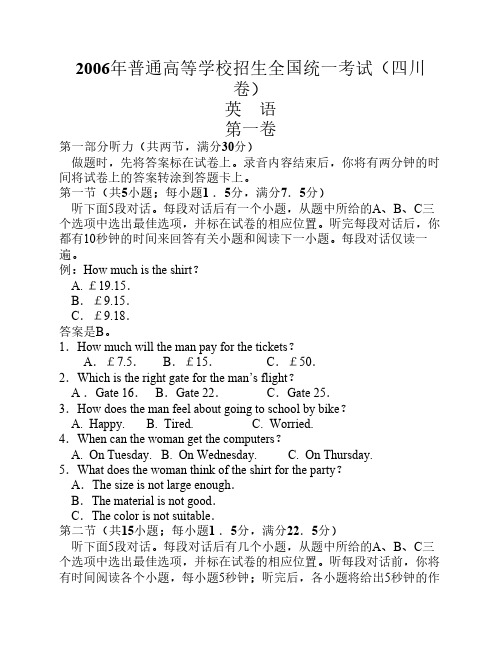
2006年普通高等学校招生全国统一考试(四川卷)英语第一卷第一部分听力(共两节,满分30分)做题时,先将答案标在试卷上。
录音内容结束后,你将有两分钟的时间将试卷上的答案转涂到答题卡上。
第一节(共5小题;每小题1 .5分,满分7.5分)听下面5段对话。
每段对话后有一个小题,从题中所给的A、B、C三个选项中选出最佳选项,并标在试卷的相应位置。
听完每段对话后,你都有10秒钟的时间来回答有关小题和阅读下一小题。
每段对话仅读一遍。
例:How much is the shirt?A. £19.15.B.£9.15.C.£9.18.答案是B。
1.How much will the man pay for the tickets?A.£7.5. B.£15. C.£50.2.Which is the right gate for the man’s flight?A .Gate 16. B.Gate 22. C.Gate 25.3.How does the man feel about going to school by bike?A. Happy.B. Tired.C. Worried.4.When can the woman get the computers?A. On Tuesday.B. On Wednesday.C. On Thursday.5.What does the woman think of the shirt for the party?A.The size is not large enough.B.The material is not good.C.The color is not suitable.第二节(共15小题;每小题1 .5分,满分22.5分)听下面5段对话。
每段对话后有几个小题,从题中所给的A、B、C三个选项中选出最佳选项,并标在试卷的相应位置。
听每段对话前,你将有时间阅读各个小题,每小题5秒钟;听完后,各小题将给出5秒钟的作答时间。
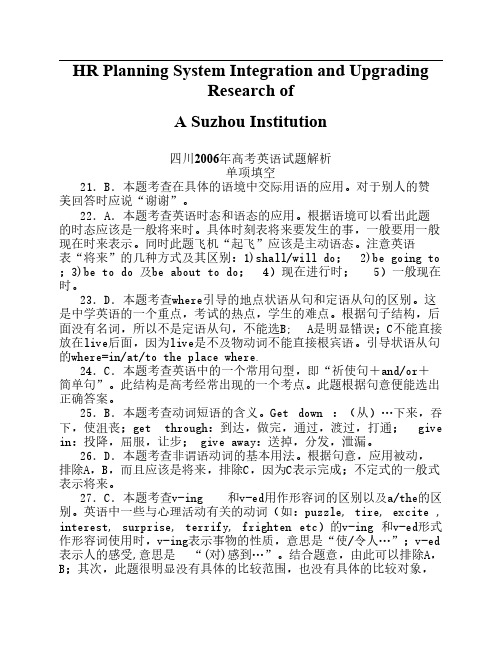
HR Planning System Integration and UpgradingResearch ofA Suzhou Institution四川2006年高考英语试题解析单项填空21.B.本题考查在具体的语境中交际用语的应用。
对于别人的赞美回答时应说“谢谢”。
22.A.本题考查英语时态和语态的应用。
根据语境可以看出此题的时态应该是一般将来时。
具体时刻表将来要发生的事,一般要用一般现在时来表示。
同时此题飞机“起飞”应该是主动语态。
注意英语表“将来”的几种方式及其区别:1)shall/will do; 2)be going to ;3)be to do 及be about to do; 4)现在进行时; 5)一般现在时。
23.D.本题考查where引导的地点状语从句和定语从句的区别。
这是中学英语的一个重点,考试的热点,学生的难点。
根据句子结构,后面没有名词,所以不是定语从句,不能选B; A是明显错误;C不能直接放在live后面,因为live是不及物动词不能直接根宾语。
引导状语从句的where=in/at/to the place where.24.C.本题考查英语中的一个常用句型,即“祈使句+and/or+简单句”。
此结构是高考经常出现的一个考点。
此题根据句意便能选出正确答案。
25.B.本题考查动词短语的含义。
Get down :(从)…下来,吞下,使沮丧;get through:到达,做完,通过,渡过,打通; give in:投降,屈服,让步; give away:送掉,分发,泄漏。
26.D.本题考查非谓语动词的基本用法。
根据句意,应用被动,排除A,B,而且应该是将来,排除C,因为C表示完成;不定式的一般式表示将来。
27.C.本题考查v-ing 和v-ed用作形容词的区别以及a/the的区别。
英语中一些与心理活动有关的动词(如:puzzle, tire, excite , interest, surprise, terrify, frighten etc)的v-ing 和v-ed形式作形容词使用时,v-ing表示事物的性质,意思是“使/令人…”;v-ed 表示人的感受,意思是 “(对)感到…”。
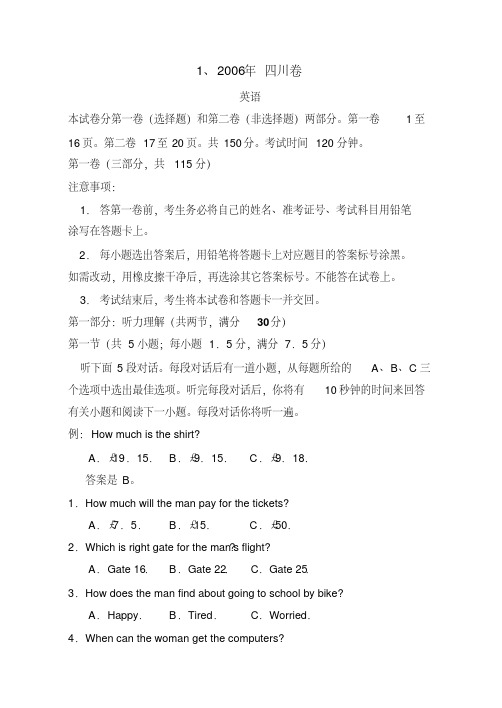
1、2006年四川卷英语本试卷分第一卷(选择题)和第二卷(非选择题)两部分。
第一卷1至16页。
第二卷17至20页。
共150分。
考试时间120分钟。
第一卷(三部分,共115分)注意事项:1.答第一卷前,考生务必将自己的姓名、准考证号、考试科目用铅笔涂写在答题卡上。
2.每小题选出答案后,用铅笔将答题卡上对应题目的答案标号涂黑。
如需改动,用橡皮擦干净后,再选涂其它答案标号。
不能答在试卷上。
3.考试结束后,考生将本试卷和答题卡一并交回。
第一部分:听力理解(共两节,满分30分)第一节(共5小题;每小题1.5分,满分7.5分)听下面5段对话。
每段对话后有一道小题,从每题所给的A、B、C三个选项中选出最佳选项。
听完每段对话后,你将有10秒钟的时间来回答有关小题和阅读下一小题。
每段对话你将听一遍。
例:How much is the shirt?A.£19.15. B.£9.15. C.£9.18.答案是B。
1.How much will the man pay for the tickets?A.£7.5. B.£15.C.£50.2.Which is right gate for the man?s flight?A.Gate 16.B.Gate 22. C.Gate 25.3.How does the man find about going to school by bike?A.Happy.B.Tired. C.Worried.4.When can the woman get the computers?。

2006年四川卷高考真题英语试卷-学生用卷一、单项选择(每小题1分,共15分)1、【来源】 2006年高考真题四川卷第21题1分—What a beautiful picture you've drawn!—A. Not at all.B. Thank you.C. You're great.D. I'm proud of you.2、【来源】 2006年高考真题四川卷第22题1分2006年高考真题四川卷2019~2020学年4月广东深圳南山区华侨城中学高一下学期月考第50题1分2021年天津高考模拟十二区重点学校联考第11题1分2019~2020学年11月天津静海区高二上学期月考第29题1分Look at the timetable. Hurry up! Flight 4026off at 18:20.A. takesB. tookC. will be takenD. has taken3、【来源】 2006年高考真题四川卷第23题1分2006年高考真题四川卷—Mom,what did your doctor say?—He advised me to live the air is fresher.A. in whereB. in whichC. the place whereD. where4、【来源】 2006年高考真题四川卷2006年高考真题四川卷第24题1分Start out right away,you'll miss the first train.A. andB. butC. orD. while5、【来源】 2006年高考真题四川卷第25题1分—The boss said we had only three days to finish the work.—Don't worry. We have already two thirds of it.A. got downB. got throughC. given inD. given away6、【来源】 2006年高考真题四川卷第26题1分The Chinese are proud of the 29th Olympic Games in Beijing in 2008.A. holdB. holdingC. heldD. to be held7、【来源】 2006年高考真题四川卷第27题1分---Did you enjoy yourself at the party?---Yes. I've never been to one before.A. a more excitedB. the most excitedC. a more excitingD. the most exciting8、【来源】 2006年高考真题四川卷第28题1分At the foot of the mountain.A. a village lieB. lies a villageC. does a village lieD. lying a village9、【来源】 2006年高考真题四川卷第29题1分—Can he take charge of the computer company?—I'm afraid it's his ability.A. beyondB. withinC. ofD. to10、【来源】 2006年高考真题四川卷第30题1分2017~2018学年新疆乌鲁木齐天山区新疆兵团第二中学高二下学期期中第61题1.5分2017~2018学年江苏宿迁泗阳县高二下学期期中第61题1.5分2019~2020学年3月河北承德承德县承德县第一中学高一下学期月考第77题1分—It's thirty years since we last met.—But I still remember the story, believe it or not,we got lost on a rainy night.A. whichB. thatC. whatD. when11、【来源】 2006年高考真题四川卷第31题1分Of all the books on the desk,is of any use for our study.A. nothingB. no oneC. neitherD. none12、【来源】 2006年高考真题四川卷第32题1分2018~2019学年黑龙江牡丹江东安区牡丹江第一高级中学高一下学期期末第4题1分—Is Jack on duty today?—It be him. It's his turn tomorrow.A. mustn’tB. won’tC. can’tD. needn’t13、【来源】 2006年高考真题四川卷第33题1分2014年北京东城区高三上学期期中2011~2012学年北京清华大学附属中学高二下学期周测with so much trouble, we failed to complete the task on time.A. FacedB. FaceC. FacingD. To face14、【来源】 2006年高考真题四川卷第34题1分—Do you mind my smoking here?—A. No, thanks.B. No, good idea.C. Yes, please.D. Yes, better not.15、【来源】 2006年高考真题四川卷第35题1分— Why didn’t you tell him about the meeting?— He rushed out of the room I could say a word.A. beforeB. untilC. whenD. after二、完形填空(每小题1.5分,共30分)16、【来源】 2006年高考真题四川卷第36~55题30分(每题1.5分)One day, Raul was miles away from the small ranch (牧场) house in a largevalley.1seemed to be all right, yet he felt strange and somewhat uneasy. The wind had picked up, and angry, dark clouds2across the sky. He could smellthe rain coming. And it did.3, the lightning flashed through the clouds, nearly4Raul. The thunder (雷声) was so loud that he buriedhis5in his hands and rubbed his eyes. Then he heard it. Hoofbeats (蹄声). He6. There before him stood a tall, white7. An old man stared down at him from its back."Wh-wh-who are y-y-you? " asked Raul. "My name is Gray Cloud, " the old mananswered8. "Come with me."Raul followed on his horse. A9feeling came over him.All10them the rain was pouring down,11not a drop fell on them. They seemed to be12back toward Raul' s home. Raul lost track of time. Then all at once he found13at the ranch gate. The old man turned his horse,14his hand, and smiled. Lightning flashed again. The old man and his horse were15.Raul's father ran out across the yard to16him. "We havebeen17sick about you. Are you okay? Hurry. Let's get in out ofthe18.""Wait, " said Raul. "Have you ever heard of an old man called Gray Cloud? ""Can't say I…wait. I19my great-grandfather used to tell stories about a man called Gray Cloud. He died a long time ago. They say he was20by lightning during a terrible thunderstorm. Why do you ask? "A. SomethingB. EverythingC. AnythingD. NothingA. droppedB. fellC. rolledD. coveredA. SuddenlyB. StronglyC. QuicklyD. HardlyA. beatingB. blindingC. burningD. touchingA. noseB. hairC. neckD. headA. looked upB. woke upC. lay downD. sat downA. tigerB. horseC. lionD. elephantA. lazilyB. angrilyC. coldlyD. slowlyA. naturalB. commonC. strangeD. badA. aroundB. besideC. throughD. aboveA. yetB. forC. soD. orA. walkingB. leadingC. headingD. returningA. themB. themselvesC. himD. himselfA. shookB. wavedC. heldD. tookA. goneB. leftC. followedD. lostA. seeB. meetC. beatD. askA. waitedB. thoughtC. worriedD. excitedA. yardB. windC. grassD. rainA. believeB. considerC. doubtD. forgetA. defeatedB. caughtC. damagedD. struck三、阅读理解(每小题2分,共40分)17、【来源】 2006年高考真题四川卷(A篇)第56~58题6分(每题2分)I was the middle child of three, but there was a gap of five years on either side, and I hardly saw my father before I was eight. For this and other reasons I was somewhat lonely. I had the lonely child's habit of making up stories and holding conversations with imaginary persons, and I think from the very start my literary ambitions (文学志向) were mixed up with the feeling of being isolated (孤独) and undervalued. I knew that I had a natural ability with words and a power of facing unpleasant facts, and I felt that this created a sort of private world in which I could get my own back for my failure in everyday life.However, the quantity of serious writing which I produced all through my childhood would not add up to half a dozen pages. I wrote my first poem at the age of four or five, my mother taking it down to dictation. I cannot remember anything about it except that TAL#NBSP it was about a tiger and the tiger had "chair-like teeth"—a good enough expression. At eleven, when the war of 1914-18 broke out, I wrote a poem which was printed in the local (地方的) newspaper, as was another, two years later, on the death of Kitchener. From time to time, when I was a bit older, I wrote bad and usually unfinished "nature poems".I also, about twice, attempted a short story which was a failure. That was the total of the would-be serious work that I actually set down on paper during all those years.(1) The underlined word "it" in paragraph 2 refers to.A. the quantity of serious writingB. the writer's first poemC. the writer's childhoodD. the tiger in the poem(2) From the text, we learn that as a little boy the writer.A. had no playmatesB. showed his gift for writingC. put out lots of poems and storiesD. got his first poem published in 1916(3) What can be inferred about the writer?A. He was least favoured in his family.B. He had much difficulty in talking with others.C. He had an unhappy childhood for lack of care.D. His loneliness resulted in his interest in writing.18、【来源】 2006年高考真题四川卷(B篇)第59~62题8分(每题2分)Welcome to Ontario Parks, a new body set up to manage Ontario's most treasured special places, the parks in our area.We are entering a very exciting year for Ontario Parks. Last season we asked some 15, 000 visitors in 45 parks how we could improve our programs and services. We also looked at the thousands of comment cards we received. As a result, new comfort stations have been added, the number of campsites has been increased, and we've made other facility (设施) improvements. In addition, we'll be providing more educational programs. This year, for example, more than 40 parks will offer special day and evening activities to excite your curiosity about nature and history.Through the Internet, you'll be happy to know that you can now explore all 270 parks on line. Let your family plan your park vacation, study a map of canoe routes, listen to the call of a loon or find up-to-date information about programs, services and facilities.So come and discover what Ontario Parks has to offer. Our parks are places to go with families and friends, for relaxation and fun, or simply to get away from it all. They are places where we can enrich our souls and "recharge our internal (内部的) batteries". They provide chances to explore nature, seewildlife, swim, canoe, camp, hike, picnic, ride a bike…You'll enjoy some of the best outdoor experiences available anywhere in the world.We urge you to make 2006 the year that you come out and have an Ontario Parks experience!(1) The writer's purpose in writing the text is to.A. tell more people the improvements in Ontario ParksB. attract more people to explore the parks on lineC. praise the beauty of nature in Ontario ParksD. have more people visit the parks(2) The facility improvements of Ontario Parks include.A. new programs and servicesB. new comfort stations and campsitesC. comfort stations and special activitiesD. new campsites and educational programs(3) From paragraph 4, we know that Ontario Parks offers visitors.A. the world's new sports and gamesB. the most exciting adventures in the worldC. many choices to relax and refresh themselvesD. chances to experience all the outdoor activities(4) According to the text, we can safely say that.A. some visitors suggested more campsitesB. about 15, 000 people visited 45 parks last seasonC. many more people will visit Ontario Parks in 2006D. the manager of Ontario Parks worries they will have fewer visitors19、【来源】 2006年高考真题四川卷(C篇)第63~66题8分(每题2分)Juanito Estrella has been a housekeeping manager on the US-based large passenger ship Carnival Spirit for 18 months and feels he has found the suitable position in his career (职业). He has alwayswanted to travel. "I guess I am a really restless spirit. I like traveling, so when the chance came, I jumped at it, " he says.The chance came in the form of a newspaper advertisement for work on cruise ships (游船). At the time Estrella was the housekeeping manager at a Melbourne hotel. He applied and, after two interviews, a medical check and police clearance, the job was his.Estrella is responsible (负责的) for the cleanliness of the ship, making sure that 160 crew work properly. "I enjoy it because there is no other work—you wake up each day in a different place and a different culture. It's exciting when you go to the next country and you don't understand the language, " he says.Estrella likes being busy and getting to know people from all over the world. The 1, 000 crew come from 94 countries, and Estrella has learnt Spanish and a little Croatian.But there is a TAL#NBSP downside."You cannot get really drunk…because you have safety responsibilities to yourself and others, " he says. "You don't really think about home. You start to think about home only when you get closer to your vacation and wonder what you'll be doing."Life on the ship is anything but cruising. Estrella and his fellows work at least 10 hours a day, seven days a week. He warns the job is not for everybody. "You have to love being busy and be prepared to work every day — and to give up drinking too much alcohol." In his spare time, if the ship sails into a port, Estrella explores it, otherwise he works out in the crew's gym, goes on the internet or calls home.(1) What do we know about Estrella?A. He is very fond of traveling.B. He doesn't drink wine now.C. He cannot speak a foreign language.D. He used to be a housekeeping manager.(2) The underlined word "TAL#NBSP downside" in paragraph 5 probablymeans.A. disappointmentB. disadvantageC. failureD. loss(3) Which of the following is true?A. Estrella doesn't often feel homesick because of his work.B. The work on the ship is not suitable for a married person.C. Estrella can find no other job except the one on the ship.D. The people on the ship are from 94 countries.(4) In the last paragraph, the writer thinks that life on the ship is.A. not a tiring journey at allB. just an interesting voyageC. far from a voyage for pleasureD. more than a pleasant travel by sea20、【来源】 2006年高考真题四川卷(D篇)第67~70题8分(每题2分)EAT YOUR VEGETABLES. Wash your hands. Always say "please" and "thank you". We are full of advice for our children, but when it comes to money, we often have little to say. As a result, our children may grow up with clean hands and good manners, but without any idea how to-manage their money.Here are some basics that will help guide them their entire lives:Show them the future. If your 13-year-old girl were to save$1, 000, invest (投资) it at 8% and add $100 every month, by the time she's 65, she would have $980, 983!Be careful of credit (信用). Credit cards can help you buy necessary things and build a credit history, but they must be used responsibly, which means paying off your debt in time. Explain to your children that when you buy something using a credit card, you can easily end up paying two or three times what you would have paid if you used cash.Teach patience. Suppose your child wants a new bicycle that costs $150. Rather than paying the cash, give him some regular pocket money and explain that by putting aside, say $15 each week, he will be able to buy it for himself in only ten weeks.Provide TAL#NBSP incentive. Tell your children the importance of saving. "For every dollar he or she agrees to save and invest rather than spend, you agree to add another dollar to the pot, " says Cathy Pareto, expert in money planning.Explain your values. Values and money are deeply intertwined, says Eilleen Gallo, co-author of The Financially Intelligent Parent. When your child demands that you buy something, explain why you really don't want to buy it. You might say, "I'd rather save that money for your education, " advises Gallo. Every time you spend or don't spend money, you have a chance to share your values.(1) The writer gives some basics to help in a proper way.A. parents teach their children how to deal with moneyB. children follow their parents' instructionsC. children manage their moneyD. parents save their money(2) The writer thinks that, if a child wants to buy something, his parentsshould.A. give him some regular pocket moneyB. encourage him to put money away for itC. explain to him the importance of investmentD. tell him to save some money by using a credit card(3) The underlined word "incentive" in paragraph 6 means.A. honorB. praiseC. excitementD. encouragement(4) What leads the writer to write this article?A. Parents want to know how to educate their children.B. He wants to share his good ideas about money matters.C. He thinks money management the most important for children.D. Parents care little about their children's management of money.21、【来源】 2006年高考真题四川卷(E篇)第71~75题10分(每题2分)Instead of hitting the beach, fourteen high school students traded swimming suits for lab coats last summer and turned their attention to scientific experiments.The High School Research Program offers high school students guidance with researchers in Texas A&M's College of Agriculture and Life Sciences. Jennifer Funkhouser, academic adviser for the Department of Rangeland Ecology and Management, directs this four - week summer program designed to increase understanding of research and its career potential (潜能).Several considerations go into selecting students, including grades, school involvement and interest in science and agriculture. And many students come from poorer school districts, Funkhouser says. "This is their chance to learn techniques and do experiments they never would have a chance to do in high school.Warner Ervin of Houston is interested in animal science and learned how to tell male from female mosquitoes (蚊子). His adviser, Craig Coates, studies the genes of mosquitoes that allow them to fight against malaria and yellow fever. Coates thought this experience would be fun and helpful to the high school students.The agricultural research at A&M differs from stereotypes. It's "molecular (分子)science TAL#NBSP on the cutting edge, " Funkhouser says. The program broadened students' knowledge. Victor Garcia of Rio Grande City hopes to become a biology teacher and says he learned a lot about chemistry from the program.At the end of the program, the students presented papers on their research. They're also paid &600 for their work - another way this program differs from others, which often charge a fee.Fourteen students got paid to learn that science is fun, that agriculture is a lot more than milking and plowing and that research can open many doors.(1) The research program is chiefly designed for.A. high school advisers from HoustonB. college students majoring in agricultureC. high school students from different placesD. researchers at the College of Agriculture and Life Sciences(2) It can be inferred from the text that the students in poorer areas.A. had little chance to go to collegeB. could often take part in the programC. found the program useful to their futureD. showed much interest in their high school experiments(3) When the program was over, the students.A. entered that collegeB. wrote research reportsC. paid for their researchD. found a way to make money(4) The underlined expression "on the cutting edge" in paragraph 5 means "on themost position".A. importantB. favourableC. astonishingD. advanced(5) What would be the best title for the text?A. A Program for Agricultural Science Students.B. A Program for Animal Science Students.C. A Program for Medical Science Lovers.D. A Program for Future Science Lovers.四、短文改错(每小题1分,共10分)22、【来源】 2006年高考真题四川卷第76~85题10分(每题1分)此题要求改正所给短文中的错误。
2006年普通高等学校招生全国统一考试(四川卷)英语本试卷分第I卷(选择题)和第Ⅱ卷(非选择题)。
满分为150分。
考试用时120分钟。
考试结束后,将本试卷和答题卡一并交回。
第一卷第一部分听力(共两节,满分30分)做题时,先将答案标在试卷上。
录音内容结束后,你将有两分钟的时间将试卷上的答案转涂到答题卡上。
第一节(共5小题;每小题1.5分,满分7.5分)听下面5段对话。
每段对话后有一个小题,从题中所给的A、B、C三个选项中选出最佳选项,并标在试卷的相应位置。
听完每段对话后,你都有10秒钟的时间来回答有关小题和阅读下一小题。
每段对话仅读一遍。
例:How much is the shirt?A.£19.15.B.£9.15.C.£9.18.答案是B。
1. How much will the man pay for the tickets?A.£7.5.B.£15.C.£50.2. Which is the right gate for the man’s flight?A. Gate 16.B. Gate 22.C. Gate 25.3. How does the man feel about going to school by bike?A. Happy.B. Tired.C. Worried.4. When can the woman get the computers?A. On Tuesday.B. On Wednesday.C. On Thursday.5. What does the woman think of the shirt for the party?A. The size is not large enough.B. The material is not good.C. The color is not suitable.第二节(共15小题;每小题1.5分,满分22.5分)听下面5段对话。
2006年普通高校招生统考(四川卷)英语第一卷第一部分听力(共两节,满分30分)做题时,先将答案标在试卷上。
录音内容结束后,你将有两分钟的时间将试卷上的答案转涂到答题卡上。
第一节(共5小题;每小题1.5分,满分7.5分)听下面5段对话。
每段对话后有一个小题,从题中所给的A、B、C三个选项中选出最佳选项,并标在试卷的相应位置。
听完每段对话后,你都有10秒钟的时间来回答有关小题和阅读下一小题。
每段对话仅读一遍。
例:How much is the shirt?A.£19.15.B.£9.15.C.£9.18.答案是B。
1.How much will the man pay for the tickets?A.£7.5.B.£15.C.£50.2.Which is the right gate for the man’s flight?A.Gate 16.B.Gate 22.C.Gate 25.3.How does the man feel about going to school by bike?A.Happy.B.Tired.C.Worried.4.When can the woman get the computers?A.On Tuesday.B.On Wednesday.C.On Thursday.5.What does the woman think of the shirt for the party?A.The size is not large enough.B.The material is not good.C.The color is not suitable.第二节(共15小题;每小题1.5分,满分22.5分)听下面5段对话。
每段对话后有几个小题,从题中所给的A、B、C三个选项中选出最佳选项,并标在试卷的相应位置。
听每段对话前,你将有时间阅读各个小题,每小题5秒钟;听完后,各小题将给出5秒钟的作答时间。
2006年普通高等学校夏季招生考试英语四川卷第一卷第一部分听力(共两节,满分30分)做题时,先将答案标在试卷上。
录音内容结束后,你将有两分钟的时间将试卷上的答案转涂到答题卡上。
第一节(共5小题;每小题1.5分,满分7.5分)听下面5段对话。
每段对话后有一个小题,从题中所给的A、B、C三个选项中选出最佳选项,并标在试卷的相应位置。
听完每段对话后,你都有10秒钟的时间来回答有关小题和阅读下一小题。
每段对话仅读一遍。
例:How much is the shirt?A.£19.15.B.£9.15.C.£9.18.答案是B。
1.How much will the man pay for the tickets?A.£7.5.B.£15.C.£50.2.Which is the right gate for the man‟s flight?A.Gate 16.B.Gate 22.C.Gate 25.3.How does the man feel about going to school by bike?A.Happy.B.Tired.C.Worried.4.When can the woman get the computers?A.On Tuesday.B.On Wednesday.C.On Thursday.5.What does the woman think of the shirt for the party?A.The size is not large enough.B.The material is not good.C.The color is not suitable.第二节(共15小题;每小题1.5分,满分22.5分)听下面5段对话。
每段对话后有几个小题,从题中所给的A、B、C三个选项中选出最佳选项,并标在试卷的相应位置。
听每段对话前,你将有时间阅读各个小题,每小题5秒钟;听完后,各小题将给出5秒钟的作答时间。
2006年全国高考英语试题四川卷及答案详解附有听力材料第一部分听力(共两节,满分30分)做题时,先将答案标在试卷上。
录音内容结束后,你将有两分钟的时间将试卷上的答案转涂到答题卡上。
第一节(共5小题;每小题1.5分,满分7.5分)听下面5段对话。
每段对话后有一个小题,从题中所给的A、B、C三个选项中选出最佳选项,并标在试卷的相应位置。
听完每段对话后,你都有10秒钟的时间来回答有关小题和阅读下一小题。
每段对话仅读一遍。
例:How much is the shirt?A.£19.15.B.£9.15.C.£9.18.答案是B。
1.How much will the man pay for the tickets?A.£7.5.B.£15.C.£50.2. Which is the right gate for the man's flight?A. Gate 16.B. Gate 22.C. Gate 25.3. How does the man feel about going to school by bike?A. Happy.B. Tired.C. Worried.4. When can the woman get the computers?A. On Tuesday.B. On Wednesday.C. On Thursday.5. What does the woman think of the shirt for the party?A. The size is not large enough.B. The material is not good.C. The color is not suitable.第二节(共15小题;每小题1.5分,满分22.5分)听下面5段对话。
每段对话后有几个小题,从题中所给的A,B,C三个选项中选出最佳选项,并标在试卷的相应位置。
听每段对话前,你将有时间阅读各个小题,每小题5秒钟;听完后,各小题将给出5秒钟的作答时间。
每段对话读两遍。
听第6段材料,回答第6,7题。
6. What can we learn about Mr. Brown?A. He is in his office.B. He is at a meeting.C. He is out for a meal.7. What will the man probably do next?A. Call back.B. Come again.C. Leave a message.听第7段材料,回答第8,9题。
8. What kind of room does the man want to take?A. A single room.B. A double room.C. A room for three.9. What does the man need to put in the form?A. Telephone and student card numbers.B. Student card number and address.C. Address and telephone number.听第8段材料,回答第10至12题。
10. What is the relationship between the speakers?A. Fellow clerks.B. Boss and secretary.C. Customer and salesperson.11. What does the man like about his job?A. Living close to the office.B. Chances to go abroad.C. Nice people to work with.12. What do we know about the woman?A. She likes traveling.B. She is new to the company.C. She works in public relations.听第9段材料,回答第13至16题。
13. When will the visitors come?A. In March.B. In April.C. In May.14. How many visitors are coming?A. 8.B. 10.C. 12.15. What will the visitors do on the second day?A. Go to a party.B. Visit schools.C. Attend a lecture.16. Where will the visitors go on the final day?A. To London. B.To Scotland. C. To the coast.听第10段材料,回答第17至20题。
17. What is the first word the baby tried to say?A. Truck.B. OK.C. Duck.18. How old was the baby when he learned to say that word correctly?A. About 18 months.B. About 21 months.C. About 24 months.19. What did the father do when the baby screamed that word at the airport?A. He corrected the baby.B. He tried to stop the baby.C. He hid himself somewhere.20. Why did the mother pretend not to know the baby?A. She got angry with the father.B. She was frightened by the noise.C. She felt uneasy about the noisy baby.第二部分英语知识运用(共两节,满分45分)第一节语法和词汇知识(共巧小题;每小题1分,满分巧分)从A,B,C,D四个选项中,选出可以填人空白处的最佳选项,并在答题卡上将该项涂黑。
例:The chairman thought_necessary to invite Professor Smith to speak at the meeting.A. thatB. itC. thisD. him答案是B。
21. —What a beautiful picture you've drawn!—_______A. Not at all.B. Thank you.C. You're great.D. I'm proud of you.21. B【解析】考查交际用语。
句意:—多美的画啊!—谢谢。
对于别人的赞美回答时应说“谢谢”。
22. Look at the timetable. Hurry up! Flight 4026 _______ off at 18:20.A. takesB. tookC. will be takenD. has taken22. A【解析】考查英语时态语态。
数表示位置转移的动词,如:go come leave start arrive等可用现在进行时表示按照计划或安排即将发生的动作。
23. —Mom, what did your doctor say?—He advised me to live _______ the air is fresher.A. in whereB. in whichC. the place whereD. where13. D【解析】句意:“医生建议住在空气比较清新的地方”。
“Where” 引导地点状语从句作“live”的状语,而不是定语从句。
24. Start out right away, _______ you'll miss the first train.A. andB. butC. orD. while24. C【解析】考查并列连词。
句意:立即动身,不然你会错过头班火车的。
“祈使句+ and/ or+ 陈述句”的祈使句部分用动词原形,连词部份用and/or;祈使部分可用名词短语。
题中前后两句话为顺接关系,故用and,相当于If you don‟t start out right away, you'll miss the first train。
25. —The boss said we had only three days to finish the work.—Don't worry. We have already _______ two thirds of it.A. got downB. got throughC. given inD. given away25. B【解析】考查短语动词辨析。
get though通过,完成。
句意:—老板说我们只剩三天时间去完成工作了。
—别担心,我们已经完成了三分之二的工作。
get down记下,使沮丧;give in投降,认输,屈服;give way赠送,泄露。
【语言学习】注意下面各句子中以上短语的含义Don‟t get this cold weather get you down.Did you get that telephone message down?As soon as I got through (with) my work, I‟ll join you in the game.I failed, but his sister got through.He gave away all his money.The rebels were forced to give in.Her expression on her face gave her away.【语言学习】get through用法1. The woman was so fat that she couldn't get through the doorway. 这女人胖得连门都通不过。
(通过)2. John has got through the examination. 约翰已经通过考试了。
(通过考试)3. The operator finally got me through. 接线员最终给我接通了电话。